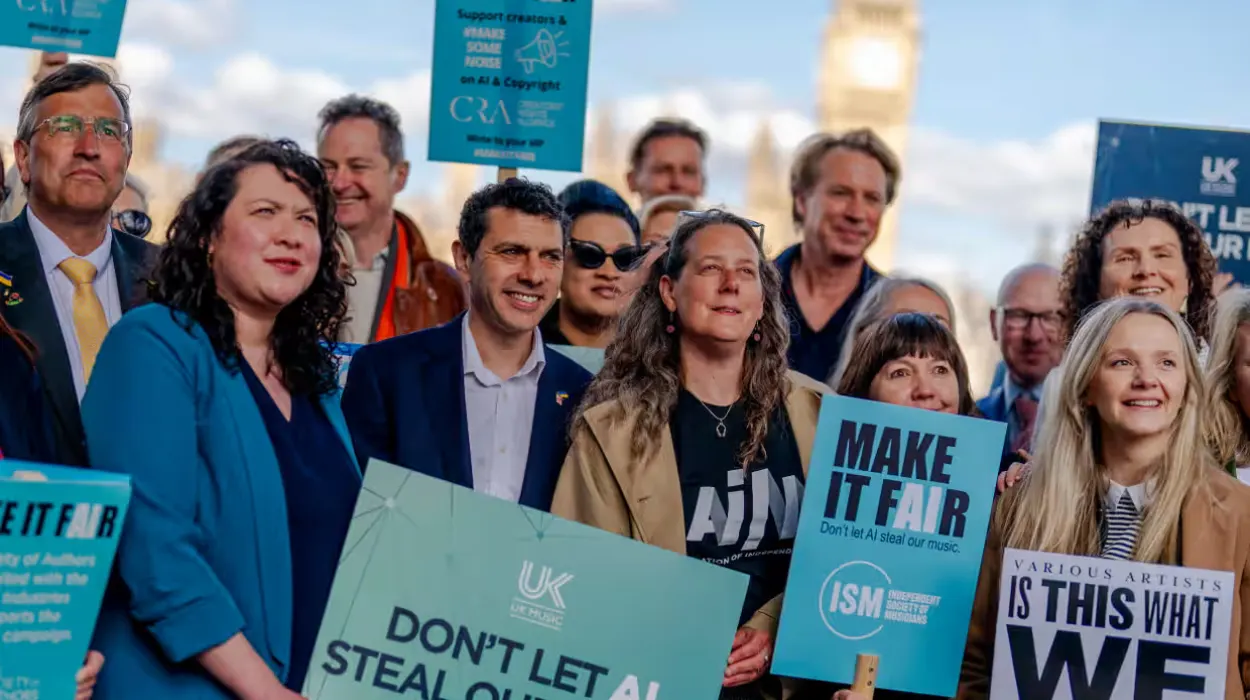UK (Parliament Politics Magazine) – Ministers propose last-minute AI concessions to avoid Lords defeat, amid backlash from artists and digital rights advocates.
As reported by The Guardian, to avoid a fifth defeat in the House of Lords, ministers offered late concessions on copyright provisions, aiming to protect a crucial bill’s progress.
The bill is being shelved amid disputes over AI firms using copyrighted work for training. Last Tuesday, the government sent a letter to peers with concessions to prevent another defeat.
What did Maggie Jones say about AI and the copyright report timeline?
Maggie Jones, Lords minister for digital economy and online safety, revealed the government’s plan to release additional technical reports on AI and copyright regulation within nine months rather than a year.
She said ministers plan to act swiftly on this issue, with amendments scheduled for Wednesday afternoon presentation.
Ms Jones stated,
“A number of noble Lords have voiced concerns during ping-pong that the government is not listening. This is simply not the case,”
adding, ministers expressed their regret regarding how the changes were implemented.
She highlighted that the new bill is expected to generate £10 billion in economic gains by updating data protection laws. It will also enhance online safety by giving authorities stronger powers to require social media firms to retain data following a child’s death.
Why is Beeban Kidron opposing the government’s copyright changes?
Beeban Kidron, the award-winning filmmaker and crossbench peer, is using the bill to challenge the government’s planned copyright reforms. The government adjusted its stance to accommodate Kidron’s demands.
On Wednesday morning, she plans to table another amendment to the bill. If she resubmits the same amendment the Commons rejected on Tuesday, and the Lords approve it, Parliament could face a rare situation of double insistence.
When the Commons and Lords cannot reach an agreement on a bill, parliamentary convention dictates that it will fail – unless ministers agree to the dissenting amendment. This outcome is very rare but not unprecedented. It occurred during the 1997–98 European Parliamentary Elections Bill. The government could explore further options to avoid a repeat.
Ms Kidron stated,
“It is in the gift of the government to accept the amendment or put something meaningful in its place. They have failed to listen to the Lords, they have failed to listen to the creative sector, they have failed to listen to their own backbenchers.”
She added,
“I have always been willing to find a route through this, but you have to ask why they feel unable to protect UK interests, and why they are giving away the country’s riches and jobs, without ensuring they have the regulatory tools necessary to negotiate a settlement. Ministers keep saying fair: what is not fair is letting one sector steal from another.”
What did Peter Kyle say about the copyright law consultation?
The technology secretary, Peter Kyle, expressed regret over launching a consultation that favoured the opt-out system as the preferred policy for copyright law changes.
What is included in the government’s AI training bill?
The government’s plans would allow AI companies to use copyrighted works for training purposes unless the owner opts out. The proposals have faced strong criticism from artists and publishers, including Paul McCartney and Tom Stoppard.
Peers in the House of Lords dealt the government a fourth defeat on Monday, approving a transparency amendment by 242 to 116 that requires AI companies to disclose how they train their models.
UK’s AI training and transparency bill
- Purpose: The bill aims to regulate AI development, requiring transparency about copyrighted material used in AI training
- Amendment passed: The House of Lords approved an amendment forcing AI firms to disclose copyrighted data sources (272-125 vote)
- Government pushback: Ministers blocked the amendment, citing financial privilege, arguing it’s not the right bill for such regulations
- Creators’ concerns: Artists (e.g., Elton John, Dua Lipa) oppose AI firms using their work without permission or payment
- Opt-Out proposal: The government favours letting AI firms use copyrighted material unless creators opt-out – critics call this unfair
- Ongoing conflict: The bill is stuck between the Lords and Commons, with no compromise yet

